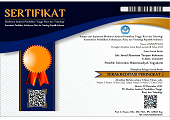Is the PPnBM Incentive Useful? A Perspective from Business Actors
Abstract
Keywords
Full Text:
PDFReferences
Alter Gabriel Liwe, Novi Swandari, W. P. (2021). Penilaian Keputusan Investasi Saham Dalam Penerapan Insentif Pajak Penjualan Atas Barang Mewah (PPnBM) Bagi Perusahaan Go Public Di Era Pandemi Covid-19 (Studi Kasus Pada Perusahaan Sektor Otomotif). Jurnal Ipteks Akuntansi Bagi Masyarakat, 5(1), 248–253.
Bontis, N. (2001). Assessing knowledge assets: A review of the models used to measure intellectual capital. International Journal of Management Reviews, 3(1), 41–60. https://doi.org/10.1111/1468-2370.00053
Brun, A. (2017). Luxury as a Construct: An Evolutionary Perspective. New Luxury Management, 1–17. https://doi.org/10.1007/978-3-319-41727-1
Brush, T. H., Bromiley, P., & Hendrickx, M. (2000). The free cash flow hypothesis for sales growth and firm performance. Strategic Management Journal, 21(4), 455–472. https://doi.org/10.1002/(SICI)1097-0266(200004)21:4<455::AID-SMJ83>3.0.CO;2-P
Colombo, D. G. e., & Cruz, H. N. da. (2023). Impact assessment of innovation tax incentives in Brazil. Innovation and Management Review, 20(1), 28–42. https://doi.org/10.1108/INMR-11-2020-0167
Indonesia, P. P. R. (2020). Pembatasan Sosial Berskala Besar dalam Rangka Percepatan Penanganan Corona Virus Disease 2019 (Covid 19). https://doi.org/10.4324/9780367802820
Indonesia, R. (2021a). Peraturan Menteri Keuangan Republik Indonesia Nomor 31/ PMK.010/ 2021 Tentang Penjualan Atas Barang Mewah Atas Penyerahan Barang Kena Pajak yang Tergolong Mewah Berupa Kendaraan Bermotor Tertentu yang Ditanggung Pemerintah Tahun Anggaran 2021. 1–15.
Indonesia, R. (2021b). Perubahan Kedua Atas Peraturan Menteri Keuangan Nomor 31/PMK.010/2021 Tentang Pajak Penjualan Atas Barang Mewah Atas Penyerahan Barang Kena Pajak Yang Tergolong Mewah Berupa Kendaraan Bermotor Tertentu Yang Ditanggung Pemerintah Tahun Anggaran 2021. Kementerian Keuangan.
Indonesia, R. (2022). Peraturan Menteri Keuangan Republik Indonesia Nomor 5/PMK.010/2022 Tentang Penjualan Atas Barang Mewah Atas Penyerahan Barang Kena Pajak yang Tergolong Mewah Berupa Kendaraan Bermotor Tertentu yang Ditanggung Pemerintah Tahun Anggaran 2021. Kemenkeu.Go.Id.
Jurlin, K. (2023). How Efficient and Socially Sensitive Are Fiscal Incentives for Electric Cars in Europe? Journal of Risk and Financial Management, 16(6), 283. https://doi.org/10.3390/jrfm16060283
Kollmann, R., Ratto, M., Roeger, W., & in’t Veld, J. (2013). Fiscal policy, banks and the financial crisis. Journal of Economic Dynamics and Control, 37(2), 387–403. https://doi.org/10.1016/j.jedc.2012.09.007
Lathif, N., Dp, S. H., & Bon, A. T. (2021). Regulation Of Sales Tax Relaxation on Luxury Goods (PPnBM) Based on Regulation of The Minister of Finance Number 20/PMK.010/2021. Proceedings of the Second Asia Pacific International Conference on Industrial Engineering and Operations Management, 2021(20), 10–17.
Lo, K. L., Fan, Y., Zhang, C., & Mi, J. J. (2021). Emission Reduction Effect and Mechanism of Auto-Purchase Tax Preference. Journal of Advanced Transportation, 2021. https://doi.org/10.1155/2021/7907773
Ma, J., & Mayburov, I. (2021). Using DID Model to Analyse the Impact of Vehicle Purchase Tax on the Sales of Alternative Fuel Vehicle. IOP Conference Series: Earth and Environmental Science, 849(1). https://doi.org/10.1088/1755-1315/849/1/012006
Mersky, A. C., Sprei, F., Samaras, C., & Qian, Z. S. (2016). Effectiveness of incentives on electric vehicle adoption in Norway. Transportation Research Part D: Transport and Environment, 46, 56–68. https://doi.org/10.1016/j.trd.2016.03.011
Ng, Y.-K. (1987). Diamonds are a Government’s Best Friend: Burden-Free Taxes on Goods Valued for their Values. American Economic Review, 77(1), 186–191.
Nguyen, H. H., Ngo, V. M., & Tran, A. N. T. (2021). Financial performances, entrepreneurial factors and coping strategy to survive in the COVID-19 pandemic: case of Vietnam. Research in International Business and Finance, 56(December 2020), 101380. https://doi.org/10.1016/j.ribaf.2021.101380
Ojha, R., Mathew, J., & Venkatesh, U. (2021). Excellence Through Downstream Innovation in Times of Pandemic: Insights from the Auto Sector. International Journal of Global Business and Competitiveness, 16(S1), 16–28. https://doi.org/10.1007/s42943-021-00032-w
Østli, V., Fridstrøm, L., Johansen, K. W., & Tseng, Y. Y. (2017). A Generic Discrete Choice Model of Automobile Purchase. European Transport Research Review, 9(2). https://doi.org/10.1007/s12544-017-0232-1
Philip, G. T. (2018). Tax Incentives and the Growth of Nigerian Manufacturing Sector. SAU Journal for Management and Social Sciences, 3(1).
Prendergast, G., & Wong, C. (2003). Parental influence on the purchase of luxury brands of infant apparel: An exploratory study in Hong Kong. Journal of Consumer Marketing, 20(2–3), 157–169. https://doi.org/10.1108/07363760310464613
Saidu, A. (2014). The Impact Of Tax Incentives On Economic Growth And Industrial Development In Nigeria. International Journal of Advanced Studies in Economics and Public, 74–85.
Santos, G., & Davies, H. (2020). Incentives for quick penetration of electric vehicles in five European countries: Perceptions from experts and stakeholders. Transportation Research Part A: Policy and Practice, 137(July 2017), 326–342. https://doi.org/10.1016/j.tra.2018.10.034
Siyanbola, T. T., Adedeji, S. B., & Adegbie, F. F. (2017). Tax Incentives and Industrial / Economic Growth of Sub-Saharan African States. Journal of Advanced Research in Business and Management Studies, 7(2), 78–90.
Wang, Q., & Zhang, F. (2021). What does the China’s economic recovery after COVID-19 pandemic mean for the economic growth and energy consumption of other countries? Journal of Cleaner Production, 295, 126265. https://doi.org/10.1016/j.jclepro.2021.126265
Yuniati, M., & Amini, R. (2020). Analisis Dampak Covid-19 Terhadap Daya Beli Masyarakat Ntb. Jurnal Penelitian Manajemen, 2(2), 362–368.
Zhang, Q., Ou, X., Yan, X., & Zhang, X. (2017). Electric vehicle market penetration and impacts on energy consumption and CO2 emission in the future: Beijing case. Energies, 10(2). https://doi.org/10.3390/en10020228
Zhang, Y., Qian, Z. (Sean), Sprei, F., & Li, B. (2016). The impact of car specifications, prices and incentives for battery electric vehicles in Norway: Choices of heterogeneous consumers. Transportation Research Part C: Emerging Technologies, 69, 386–401. https://doi.org/10.1016/j.trc.2016.06.014
DOI: https://doi.org/10.18196/jati.v6i2.18258
Refbacks
- There are currently no refbacks.
Copyright (c) 2023 Jati: Jurnal Akuntansi Terapan Indonesia

This work is licensed under a Creative Commons Attribution-NonCommercial 4.0 International License.
Jati: Jurnal Akuntansi Terapan Indonesia is indexed by :
Office:
Editorial of Jati UMY, Building D, Jl. Brawijaya, Tamantirto, Kasihan, Bantul, Yogyakarta.
Telp: (0274) 387656
Fax: (0274) 387646
WA: +62 858-3939-7548 (Puspita Dewi)
Email: jati@umy.ac.id
Based on a work at https://journal.umy.ac.id/index.php/jati/index

Jati : Jurnal Akuntansi Terapan Indonesia is licensed under a Creative Commons Attribution-NonCommercial 4.0 International License.
















